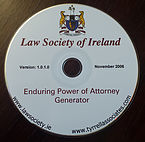Enduring Powers of Attorney
What is an EPA

An Enduring Power of Attorney (EPA) enables you (the “donor”) to choose a person you trust (called an "attorney") to manage your property and affairs and/or personal care in the event of you becoming mentally incapable of doing so.
An EPA is a document that allows you to plan for the future while you are in good health. The document is executed at any time when you have full mental capacity but does not come into effect until such time you lose mental capacity to make decisions at which point the appointed attorney(s) register the EPA with the Wards of Court. The registration process involves filing a report showing that you lack mental capacity.
The terms of the EPA may give the attorney(s) either a) specific powers or b) general authority to act on your behalf in relation to your financial and business affairs and your personal care decisions.
Because an enduring power of attorney involves the transfer of considerable powers from the donor to the attorney there are a number of legal safeguards to protect the donor from abuses.
It is possible to execute an EPA whose terms cover only personal care decisions. Personal care decisions include:
- where you should live,
- whom you will live with,
- who you should see or not see,
- what training or rehabilitation you should get,
- your diet and dress,
- who can inspect your personal papers,
- housing, social services and other benefits.
When is the right time to make an EPA?
There is no specific time criteria to entitlement but it is essential that EPA is made at a time where there is no question as to mental capacity. Its validity can be challenged by the family if they feel that did not have the capacity. Such challenges are handled in the High Court where the original EPA is set aside and donor made a ward of court. This is an expensive and can lead to breakdown in family relationships.
How does it differ from a general Power of Attorney?
It differs from an ordinary power of attorney which can operate when you have mental capacity but you may wish to appoint somebody temporarily to make certain decisions on your behalf, for example, if you are aboard for a period of time.
What happens if I do not have an EPA?
If you do not have an EPA in place and you no longer have the mental capacity to manage your own affairs, your assets, properties and money may be frozen making it impossible for your family to access these resources unless they are jointly owned by you and that person and that other person has full authority to use the joint assets. In such circumstances, your family may need to apply to make you a Ward of Court giving the court the power to make decisions on your behalf whereupon a judge will appoints a committee (usually a family member(s)) to attend to your affairs. However, the person appointed may not be person(s) that you would prefer to fulfill the role. Also, the cost of making a person a Ward of Court is substantially greater than executing and registering an EPA.
Who can make an EPA?
Any person over the age of 18 years that has assets and has full mental capacity. If you are a bankrupt you can only make an EPA for personal care decisions only.
Choosing your attorney(s)
You can choose anyone to act as an attorney but it would usually be your spouse, partner or family member but need not be any of the aforementioned. There are no regulations limiting the number of attorneys but typically there is usually a maximum of two as logistics of more than that can be difficult.
Your choice of attorney(s) is very important and the following should be taken into consideration when making that decision.
- Do you trust each of your attorneys to make decisions in your best interests? If not, then consider whether these are the right attorneys for you.
- Do your attorneys know what you would decide if you had the mental capacity to do so?
- What might stop your attorneys working together? Do they get on? What would happen if they fell out?
- Even if you attorneys can act jointly and severally are there any decisions that you would like them to act jointly? If so, you may wish to impose a restriction. See Imposing restrictions.
- Do your attorneys understand how you would like them to make decisions?
- Do you what will happen if one attorney can’t act anymore?
- Do you want to appoint deputy attorneys?
The EPA makes provision for you to place some restrictions on their decision making ability.
Attorneys are not entitled to be paid but provision is available should you wish to compensate them financially. It is not generally done if the attorney is a family member, however, solicitor or accountant may get payment.
Alternate attorneys have no involvement unless the original attorney(s) cannot proceed.
How should my attorney's act? Jointly OR Jointly and Severally
If you have more than one attorney, you must decide if they can act independently or if they need to work together and agree all decisions unanimously.
Jointly
Attorneys must make all decisions together. They must agree unanimously and they must each sign all relevant documents.
This option is chosen where the donor wishes that all attorneys must agree on each decision no matter how small. This option can offer some protection in so far as no one individual can make decisions that are in their best interests and not the donors.
Conversely,
- if your attorneys can’t all agree on a decision then it can’t be made
- if your attorneys can’t work together your EPA can’t work
- If one attorney can no longer act or dies then the EPA will stop working unless deputy attorneys are appointed.
Jointly and severally
Your attorneys can make decisions on your behalf independently or together.
It is possible that one attorney can make a decision without consulting the other attorneys.
Conversely,
- This option is more flexible and practical for attorneys
- Attorneys can make simple urgent decisions
- If an attorney can no longer act then the EPA won’t be cancelled.
- Who should be notified?
- You must give notice of the execution of the EPA as soon as practicable to at least two persons. Neither of them may be an attorney.
It is important that a solicitor advises the client carefully of the order of persons who must be notified which are clearly set out in Paragraph 7 of the Enduring Powers of Attorney Regulations 1996.
At least one must be
- the donors’ spouse, if they are living with the donor and so long as they have not been named as an attorney, or
- if (1) does not apply (if the donor is unmarried, widowed, separated or their spouse has been named as an attorney) notification must be given to a child of the donor or
- if (1) and (2) do not apply, to any relative (i.e. parent, sibling, grandchild. widow/er of a child, nephew or niece, in that order).
- If, and only if there are no suitable relatives available to be named as notice parties, notice may be given to a non-relative.
- Where a spouse is appointed as attorney, the spouse may not be a notice party. In this case, the donor should notify a child. If there are no children or if all children are already appointed as attorneys, another relative may be used as a notice party.
- Attorneys cannot be a notice party.
- Notice parties receive a formal notification when the EPA is signed setting out the details. Notice parties can object if they feel the attorneys are inappropriate.
- Notice parties are notified if the EPA is being activated. They may object if they have any doubts as to the actions of the attorney(s).
What safeguards are in place to prevent abuse?
Because an enduring power of attorney involves the transfer of considerable powers from the donor to the attorney there are a number of legal safeguards to protect the donor from abuses.
- The procedure for executing an EPA requires the involvement of a solicitor and a doctor
- The EPA can only come into effect when the original document is registered in the office of the High Court.
- The attorneys cannot act until the EPA is registered.
- A second medical cert is required at registration confirming the donor’s mental capacity
- At least 2 notice parties are assigned and they have can object to the registration of the EPA should they feel that the donor has sufficient mental capacity to make decisions on their own.
- Notice parties are given 5 weeks to submit objections.
